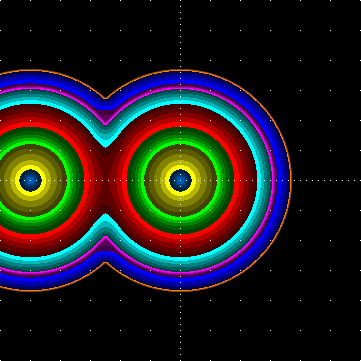



|

|

|
| In left plots, specific illuminances by a continuous row of luminaires spaced 5 and 6 heights are shown in their left halves (right half concerns a single luminaire). | The right plot is for a single luminaire, unrotated. | |

Values below the scale are illuminance / 1 lx. This is for (unrealistic) “unit” case that luminaires would have lamps producing 1 klm only, would be point-like and just 1 m over the terrain.
# IESNA: LM-63-1995
# [TEST] 763568
# [DATE] 2/24/94
# [MANUFAC] COOPER LIGHTING
# [LUMCAT] EGL91SXX55
# [LUMINAIRE] 1000W HPS 5H X 5V FLOOD
# [LAMP] 1000W HPS CL E-25
# [_REFLECTOR] SPUN ALUMINUM
# [_REFRACTOR] CLEAR FLAT GLASS
# [_SOCKET POSITION] AXIAL
# [_LAMP LUMENS] 140000
# TILT=NONE
# Bulbs: 1, 140000 lm each
# Number of measured angles: 37 vertical, 1 horizontal ones
# Photometric type: 1, Units type: 1
# Luminous opening diameter (and height?): 1.830 ( 1.750 )
# Ballast factor: 1, Input power: 1000 W
# Source file: egl91s55.ies
# Luminaire flux =109381 lm,
# 78.1 % of the bulb flux
# between 75 and 90: 0.0 % of the luminaire flux
# - this part causes just GLARE in case of road lighting and similar purposes
# 80deg and above: max 0.0 cd / 1000 lm , 0.0 % of the luminaire flux
# 90deg and above: max 0.0 cd / 1000 lm , 0.0 % of the luminaire flux
# CutOff Type: Full_CutOff
# 62.5 deg to <67.5 deg: max 22 cd / 1000 lm,
# 67.5 deg to < 76 deg: max 9 cd / 1000 lm,
# maximum spec. lum. intensity 1949 cd / 1000 lm
# The following table gives luminous intensities which would be produced
# using a hypothetic bulb giving a luminous flux of 1000 lm (i.e., cd/klm):
0.0 1815
2.5 1949
5.0 1711
7.5 1264
10.0 907
12.5 685
15.0 545
17.5 455
20.0 392
22.5 346
25.0 310
27.5 282
30.0 257
32.5 235
35.0 218
37.5 206
40.0 196
42.5 185
45.0 171
47.5 153
50.0 129
52.5 98.5
55.0 65.9
57.5 43.2
60.0 30.6
62.5 22.2
65.0 15.2
67.5 9.1
70.0 3.6
72.5 0.1
75.0 0.0
77.5 0.0
80.0 0.0
82.5 0.0
85.0 0.0
87.5 0.0
90.0 0.0